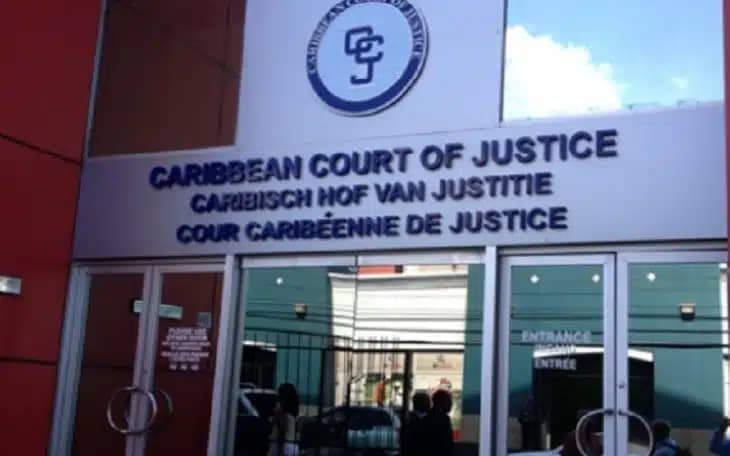
On 23 June 2023, the Caribbean Court of Justice (CCJ) in collaboration with the Judiciary of Guyana, hosted sensitisation sessions for members of the Judiciary and the Bar Association of Guyana, at the Arthur Chung Conference Centre, Georgetown, Guyana.
The sessions formed part of the Court’s stakeholder engagement initiatives conducted during the recently concluded visit to Guyana.
The sensitisation sessions are the latest instalments in a series of workshops aimed at increasing awareness of the CCJ’s Original Jurisdiction.
This is the third such engagement with Belize and Trinidad and Tobago benefitting previously.
This initiative is co-funded by the European Union through the 11th European Development Fund (EDF).
The session with the judiciary was led by CCJ Judge, the Honourable Mr Justice Peter Jamadar.
It featured an address by CCJ President, the Honourable Mr Justice Adrian Saunders and presentations by the Honourable Mr Justice Wit and Dr Chantal Ononaiwu, Director of External Trade at the CARICOM Secretariat.
In his opening remarks, President Saunders noted that ‘the Revised Treaty of Chaguaramas (RTC) and the CARICOM Single Market & Economy (CSME) created by it, provide a framework for the collective achievement of sustainable economic and social development for the peoples and states of CARICOM.’
The CCJ exists at the centre of this framework created by the RTC, having exclusive and compulsory jurisdiction to interpret and apply the RTC.
Consequently, the CCJ is the only court that can rule on matters concerning breaches of the rights granted under the CARICOM Single Market and Economy (CSME).
Such rights include the freedom of movement of skills and labour, money, goods and services and the right of establishment.
Despite this role in guarding the rights under the CCJ, the President also acknowledged the importance of national courts in developing regional law, asserting that ‘there is a unique and critical role to be played by national courts and tribunals in shaping Community law.
Indeed, through the referral process, national courts work with and alongside the CCJ with a view to ensuring that the full potential of the CSME is realised and treaty rights and obligations are respected and observed.
The referral process can be seen as a dialogue between the national courts and the CCJ with the aim of ensuring uniformity in the development, interpretation and application of CARICOM law.’
The session with the Bar Association themed the ‘Duties of Attorneys to their Clients, the Court, and The State’ had the Honourable Mr Justice Denys Barrow, CCJ Judge as the lead facilitator.
The programme featured presentations by the CCJ President, the Honourable Mr Justice Adrian Saunders, Mr Justice Barrow and Mr Justice Anderson.
There were also interventions by the newly-elected President of the Bar Association of Guyana, Ronald Burch-Smith and an interactive session spanning several thought-provoking topics including the referral process, compliance with the Code of Conduct, the distinction between criticism and contempt as it relates to the defamation of judges, attorney-client confidentiality in the age of money –laundering.
By incorporating group simulation exercises and discussing various scenarios, participants were able to determine how they would treat with matters concerning the application and interpretation of the RTC were raised.
It is anticipated that the next workshop in this engagement series, will be held in Barbados. The CCJ’s mission to Guyana officially ended on 27 June.
CLICK HERE TO JOIN OUR WHATSAPP GROUP
CLICK HERE TO JOIN OUR WHATSAPP GROUP
CLICK HERE TO JOIN OUR WHATSAPP GROUP
CLICK HERE TO JOIN OUR WHATSAPP GROUP
CLICK HERE TO JOIN OUR WHATSAPP GROUP
CLICK HERE TO JOIN OUR WHATSAPP GROUP
Advertise with the mоѕt vіѕіtеd nеwѕ ѕіtе іn Antigua!
We offer fully customizable and flexible digital marketing packages.
Contact us at [email protected]
















